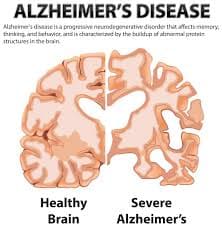From Insulin Resistance to Alzheimer's: Change Your Diet to Prevent Cognitive Decline
The link between insulin resistance and Alzheimer's is so strong that Alzheimer's is sometimes referred to as "type 3 diabetes." Around 80% of Alzheimer's patients have insulin resistance or type 2 diabetes

The link between insulin resistance and Alzheimer's is so strong that Alzheimer's is sometimes referred to as "type 3 diabetes." Around 80% of Alzheimer's patients have insulin resistance or type 2 diabetes.
Here's Some Mind-Blowing Information
Alzheimer's begins long before any memory issues become noticeable. The reduced brain glucose metabolism caused by insulin resistance, called "glucose hypometabolism," can start decades before symptoms like forgetfulness.
Using special brain imaging, scientists have detected glucose hypometabolism and an increased risk of Alzheimer's in women as young as their 20s! By the time mild cognitive impairment sets in, indicating early Alzheimer's, the hippocampus has already shrunk significantly.
Understanding insulin resistance is incredibly important for physical and mental health, yet many people (and some doctors) don't know much about it.
The facts show that insulin resistance has become widespread in the USA, affecting over half the population! It's a hormonal condition that leads to inflammation, disrupts cholesterol and fat metabolism, and impairs your ability to process carbohydrates properly.
Having insulin resistance puts you at higher risk for some serious health issues like obesity, heart disease, cancer, and type 2 diabetes. But here's something even more shocking - researchers now recognize that insulin resistance is the driving force behind most cases of Alzheimer's disease.
Read our latest Newsletter...


What Exactly Is Insulin Resistance?
- Insulin is a powerful hormone that controls how your cells get vital nutrients like glucose (sugar).
- Normally, insulin acts like a key, unlocking muscle and fat cells to absorb glucose from the bloodstream after you eat sugary or starchy foods.
- When blood sugar and insulin levels spike too frequently, cells can become overexposed to insulin's effects. To protect themselves, they start reducing their insulin-sensitivity - insulin resistance.
- To compensate, the pancreas pumps out even more insulin to help get that glucose into cells. But the more insulin in the blood, the more resistant cells become.
- Over time, this vicious cycle can lead to consistently high blood sugar levels and potentially type 2 diabetes.
Find our comprehensive beginners guide to Nutrition, to help you on your way...

How Does Insulin Resistance Affect the Brain?
- Most cells need insulin to properly use glucose for energy, brain cells can absorb glucose without insulin's help.
- However, they still require insulin to metabolize and process that glucose.
- Even though the brain gets plenty of glucose, brain cells in insulin-resistant individuals start starving from the inside out due to lack of insulin.
- The hippocampus (the brain's memory centre) is especially vulnerable since it needs extra glucose boosts for fuel. If it can't get enough insulin, it struggles to form new memories.
- Over time, it can start shrivelling, leading to the memory problems so characteristic of Alzheimer's disease.
The Good News is - You Can Reduce Your Risk
We used to feel powerless against Alzheimer's since major risk factors like age, genetics, and family history were out of our control. But now we know that insulin resistance, which is lifestyle-related, plays a huge role that you can do something about through diet!
The bad news? Insulin resistance is so common that chances are, you already have it to some degree.
Our bodies can handle the carbs from whole foods like apples and sweet potatoes, but they aren't equipped for modern refined carbs like white flour and added sugars. Simply put, refined carbs can damage your brain over time. While you can't change your genes or age, you can change how you eat. Making smarter carb choices is key for reducing Alzheimer's risk.
How To Protect YOUR Brain
- Get tested for insulin resistance. Simple blood tests like glucose, insulin, triglycerides, and HDL cholesterol can give your doctor an idea of your insulin sensitivity when combined with other factors like waist size and blood pressure.
- Avoid refined carbs like the plague starting now! Even if you don't have insulin resistance yet, constantly eating these processed carb bombs puts you at high risk of developing it.
- If you are insulin-resistant, watch your total carb intake. Unfortunately, people with insulin resistance need to go easy on all carb sources, not just refined ones. Swap out most carbs for healthy proteins and fats.
You have more power over insulin resistance and cognitive decline than you think! Blood sugar and insulin levels can improve dramatically in just weeks by changing your diet. One study even showed that a low-carb, high-fat diet boosted memory in only six weeks in people with mild cognitive impairment.






